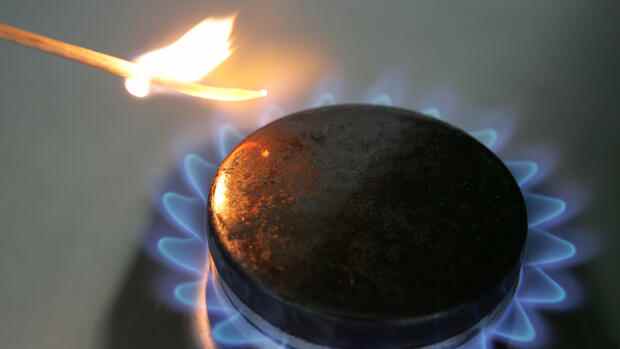With a gas price cap, the supply could collapse faster in Germany than in other countries.
(Photo: AP)
Brussels German economists warn of an uncontrolled collapse of the gas market if the EU sets maximum prices. Achim Wambach, President of the Center for European Economic Research (ZEW), fears that the economic damage caused by stopping Russian deliveries will be “many times higher” if price mechanisms are no longer effective. “Capping the price of gas can only be a last resort,” he said.
Claudia Kemfert from the German Institute for Economic Research (DIW) also fears harmful effects: “It is not prices that have to be capped, but the costs. Tax money for Putin energy is not a good idea,” she said. A gas price cap would reduce the incentive to save gas, “which is completely the wrong approach at the moment”.
The EU Commission wants to present its considerations on interventions in the electricity and gas market this Wednesday. In drafts that are already circulating, the effects of a gas price cap are being played out for the first time. According to the Commission, such a cap could be necessary if Russia stops supplying gas so that prices remain sustainable.
The next payments for Russian gas are due at the end of the month. The Kremlin wants customers to set up ruble accounts with Gazprombank. Since the companies from Poland and Bulgaria refused in April, Gazprom stopped deliveries to these countries. This could now also threaten other countries.
Top jobs of the day
Find the best jobs now and
be notified by email.
So what? Two scenarios are conceivable: Either the states could take over the distribution of the gas themselves, which means that free trade in gas would be suspended. Or the market is preserved as much as possible, even if prices climb to even higher levels.
Early contingency plans required
Marc Oliver Bettzüge from the University of Cologne expects that the states will suspend free trade. “The important thing is how that is coordinated,” said Bettzüge. “The price would then primarily have the function of a unit of account.” So it is paid, but is no longer formed on the market and therefore no longer indicates shortages. It is right that this price is set by the state in such a case. The plans for this should be decided as soon as possible: “The earlier the emergency plans are available, the better,” he said.
This is apparently how the EU Commission is currently assessing it. However, this could have negative consequences for Germany and domestic industry.
Andreas Loezel from the University of Bochum is alarmed: “Especially in view of the risk of a delivery stop, we need the price signals.” Only the currently very high prices for electricity and gas can ensure that gas and other flexibility technologies are used as efficiently as possible. This is the best protection against shortages, because energy is already being saved today. “If some European countries introduce a price cap, that will thwart the savings efforts in other countries,” said Loeschel.
The discussion is mainly driven by today’s prices. Some EU countries are counting on prices falling immediately as soon as a possible price cap is announced for the future, as Georg Zachmann from the Bruegel Institute in Brussels explains: “The Commission’s proposal aims to calm the market and thus the current gas – and lower electricity prices.”
In view of the risk of a delivery stop, we need the price signals. Andreas Loechel, economist at the Ruhr University Bochum
Falling prices would also help German consumers and companies. But if there were actually a supply stop and an EU-wide regulated gas allocation, Germany would probably have a problem. So far, a particularly large amount of gas from Russia has arrived here, so the problem of a supply interruption would be correspondingly large. In addition, the gas storage facilities are less full than in other countries.
Although there is a solidarity mechanism within the EU intended for the event that a single country has problems with the gas supply. But if many countries are suddenly undersupplied, it would hardly help.
More Handelsblatt articles on the subject:
Cohesion in the EU would be put to the test. The countries that are insufficiently connected to alternative gas suppliers, such as Germany and Austria, would have the worst starting position.
As long as prices are free to set, Germany has an advantage with its high financial power. If the prices are fixed by the state, this advantage disappears. Germany would have to rely on the solidarity of its EU partners.
Bruegel expert Zachmann takes a critical view of this. If there is a price cap, there is a risk that gas flows between countries will come to a standstill. “Why should you sell gas to neighboring countries at low prices when your own industry can use this gas to maintain labor and added value?”
More: Energy Hope Liquefied Natural Gas: How Does a Floating LNG Terminal Work?
